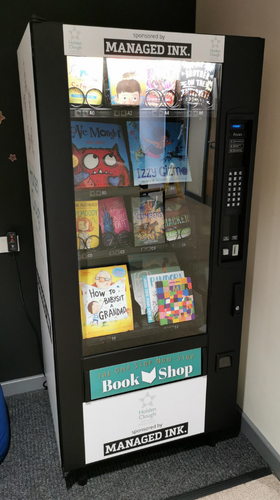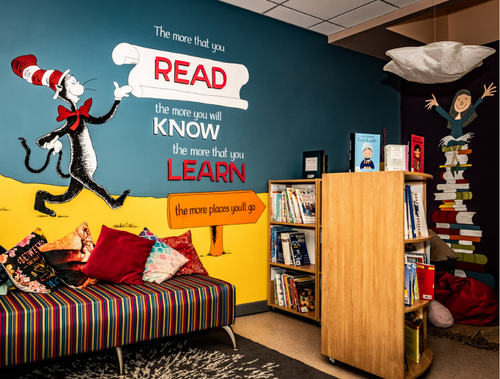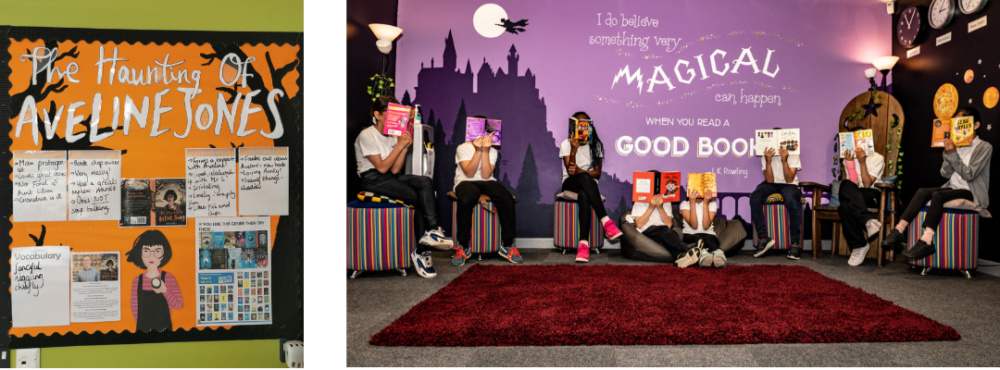Funding your Reading for Pleasure campaign
4 October, 2022
The key role that Reading for Pleasure plays in children’s academic attainment, mental wellbeing and future success in life is now widely accepted. However, with budgets already stretched to the limit, many primary schools struggle to provide their pupils with access to the wide range of books and reading material that are needed to engage and develop young readers.
As the English Lead at Holden Clough Community Primary School near Oldham, Adam Porter was committed to creating a school culture with Reading for Pleasure at its core. Over two years he led a fundraising campaign that successfully raised £12,000 to support the school’s Reading for Pleasure goals. We talked to Adam and asked him to share some of his insights and top fundraising tips.
Have a clear aim for the fundraising
Adam: Fundraising isn’t easy and there’s no denying it takes a huge effort. The first thing you need to ensure is that your fundraising has a clear focus and supports your overall goals. As a school, we prioritised fundraising for reading because we wanted to:
- Encourage our pupils to be more engaged and enthusiastic readers. (I’d be lying if I didn’t also admit that our reading outcomes weren’t where we wanted them to be and we wanted to address this).
- Ensure that all our pupils had access to high-quality texts: we have a high number of EAL students and the school is located in an area of high social deprivation so, for many of our pupils, access to books is an issue.
Having established that the focus of the fundraising was to develop our reading culture, we realised that goals such as ‘money raised goes towards reading provision’ were too vague. Our goals needed to be more specific so that everyone knew exactly how the money would be spent. We made it really clear from the outset that all funds raised were to be used to:
- Improve our indoor and outdoor library spaces and make them more inviting.
- Expand the selection of books on offer.
Engage all key stakeholders
Adam: It’s vitally important that you involve all your stakeholders and ensure that they are aware of how your fundraising efforts will benefit them. (We don’t have a PTA at our school, but I’d definitely suggest getting them on board if you have one.) We made sure we engaged our whole school community from an early stage by sharing our plans for the library spaces as well as our intended fundraising targets.
For staff, the benefits were very easy to see: new, re-invigorated library areas that provide the perfect space for them to take their class to enjoy their class read, and a host of new books (including lots of non-fiction titles) that could be incorporated into their teaching – particularly when it comes to the wider curriculum.
Put together a programme of fundraising initiatives for the year
Adam: Whole school fundraising events take time to organise and often depend on the goodwill of staff so make sure your plans are realistic. We packed a lot of events into one year but, with hindsight, I would probably aim for one bigger fundraising event per term and then identify some smaller ‘quick-wins’.
Whole school fundraising events
Film Nights: We held three film nights for each year group over the course of the year. The film nights took place in the hall straight after school and featured films that either linked to the year group’s topic or the book that the pupils were studying as part of guided reading. Tickets cost £5 per child, which included popcorn and hot chocolate (don’t tell our PSHE lead as this contravenes our Healthy School policy somewhat). Pupils were allowed to come dressed in their pyjamas and could bring any additional snacks and a pillow if they wished.
We are a two-form entry school and attendance is usually pretty healthy at such events. A full complement of 60 children gave us a potential £300 per year group per film night, and £900 per year group raised over the year. Multiply that by the number of year groups and that’s a whopping £5400! We raised just shy of that with £5200 but this allowed us to do most of the improvements to the two library areas.
Colour Run: This was a bit more left-field and definitely requires the good will of staff. We bought 500 colour sachets for £100. These were then sold to children – and indeed parents – for £1 per sachet to throw at staff volunteers as they completed a run around the playground. The children loved it, and we made £400 in profit!
Sponsored Reading Event: We held a week-long Usborne Sponsored Read Event that asked pupils to read as much as they could over the course of the seven days and to keep a note of their reading in a reading log. We promoted the event to parents via our parent communication platform (Class Dojo) and social media and encouraged pupil participation with prizes for ‘most read’ and ‘most raised’ in each class. We managed to raise just over £1500 in sponsorship which Usborne topped up with a further 60%, giving us just shy of £2500 to spend on new Usborne books.
Book Fairs: We also held two Scholastic book fairs to tie in with our Parents’ Evenings. The week-long fairs were open before and after school, and both staff and children were involved in running them. We again promoted heavily on parent communication and social media platforms and were able to generate £1900 of sales. As a result, Scholastic gave us 60% of this figure in rewards to spend on books from their website.
Further resources from Literacy Hive: There are a number of companies that run school book fairs, each offering a slightly different reward scheme, selection of books or level of support. Compare the different options and choose the one that best suits your school’s needs.
And a couple of ‘quick-wins’
‘Bring a Book for your Birthday’ was an idea that first originated from a school governor. Previously, children would bring in sweet treats to share with the rest of the class on their birthdays. We decided to phase out this tradition and, instead, children now donate a book of their choice to the school. We encourage them to write a personalised message on the inside of the cover along with their name. This has bolstered our school book collection no end!
Create and publicise a ‘wish list’. We created a wish list on Amazon that included literally hundreds of books selected by teachers, pupils and parents – even our caretaker made some suggestions! We then set about publicising this wish list to parents (some decided to buy their child’s Birthday Book from this list) and local businesses. All in all, the wish list yielded more than £2000 in book donations.
Further useful resources from Literacy Hive: Online specialist children’s books suppliers Bookwagon and A New Chapter also offer wish list services along with expert advice on book selection. LoveReading is an online bookstore that enables member schools to earn 25% of the cover price when parents, carers and the local community buy books from their websites. A wish list can also be a great way to work with your local bookshop.
Once you have your new books, thank people for their contribution with a ‘Donated by’ bookplate. Bookplates UK provides a selection of bookplates created by top children’s illustrators that you can download for free.
Reach out to your local community
Adam: When we were publicising our wish list, the school business manager drew up a list of key school suppliers. I then emailed them, asking if they would be willing to donate a book – or books – from the list. Local coach and taxi companies that we’d used for transport to extra-curricular events; the company responsible for servicing our fire alarms; even our local supermarket all contributed. Other companies decided to donate directly to school funds instead. This process of contacting local companies and services is now something we do at the start of every academic year.
 We also approached a host of local companies to see if they’d be interested in purchasing and sponsoring a reconditioned book vending machine for the school. Amazingly, it didn’t take long for someone to take us up on the offer. The book vending machine features the company branding alongside the school logo and we publish pictures of our ‘Readers of the Week’ with their chosen book prizes on social media with the company’s name. As a bonus, when the company saw the positive impact the book vending machine was having on reading within the school, it also decided to contribute towards the funding of our book spine stair stickers.
We also approached a host of local companies to see if they’d be interested in purchasing and sponsoring a reconditioned book vending machine for the school. Amazingly, it didn’t take long for someone to take us up on the offer. The book vending machine features the company branding alongside the school logo and we publish pictures of our ‘Readers of the Week’ with their chosen book prizes on social media with the company’s name. As a bonus, when the company saw the positive impact the book vending machine was having on reading within the school, it also decided to contribute towards the funding of our book spine stair stickers.
Now that vending machines are moving to contactless payment, I think it’s worth contacting vending machine companies to see if they would be willing to donate any decommissioned machines that might be lying around. You never know, you may just get lucky! We even raffled off the name of the machine: children paid £1 per entry for a name of their choice. The draw was made live on social media and we raised another £200.
Further useful resources from Literacy Hive: The Support Your School website is free to use and allows schools to set up and manage a fundraising page to help them raise money from the wider community specifically for books. Let’s Localise is a digital fundraising platform open to every state school in the UK that allows teachers and schools to tap into community support to access volunteer time, skills and other resources.
Keep People Updated
Adam: Ensuring the support of your stakeholders is vital so it’s important that everyone is kept updated, both in terms of how the fundraising is going and where the money has been spent. Social media has been great for letting the wider school community know exactly what we are doing to improve our reading culture and I honestly believe that good communication has been key to our fundraising success.
I would also recommend measuring and sharing the impact of any fundraising with your funders. We conducted pupil voice surveys to capture children’s feelings about the library areas and their attitudes to reading before and after the improvements were made. The results were astonishing and showed that the time, energy and commitment to the fundraising effort had all been worth it!


